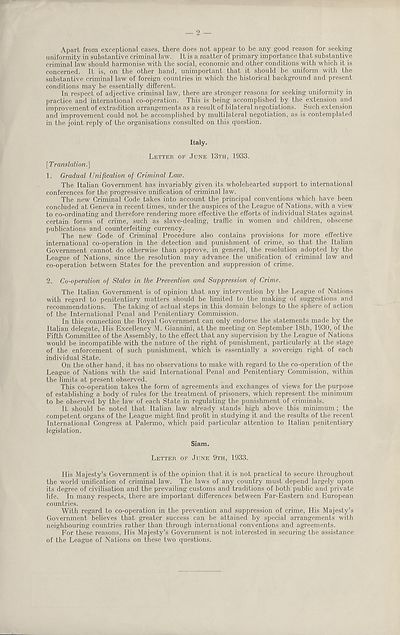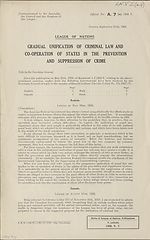Legal > Gradual unification of criminal law and co-operation of states in the prevention and suppression of crime [replies received from Austria, Canada, Italy Siam]
(2)
Download files
Complete book:
Individual page:
Thumbnail gallery: Grid view | List view

— 2 —
Apart from exceptional cases, there does not appear to be any good reason for seeking
uniformity in substantive criminal law. It is a matter of primary importance that substantive
criminal law should harmonise with the social, economic and other conditions with which it is
concerned. It is, on the other hand, unimportant that it should be uniform with the
substantive criminal law of foreign countries in which the historical background and present
conditions may be essentially different.
In respect of adjective criminal law, there are stronger reasons for seeking uniformity in
practice and international co-operation. This is being accomplished by the extension and
improvement of extradition arrangements as a result of bilateral negotiations. Such extension
and improvement could not be accomplished by multilateral negotiation, as is contemplated
in the joint reply of the organisations consulted on this question.
Italy.
Letter of June 13th, 1933.
[Translation.]
1. Gradual Unification of Criminal Law.
The Italian Government has invariably given its wholehearted support to international
conferences for the progressive unification of criminal law.
The new Criminal Code takes into account the principal conventions which have been
concluded at Geneva in recent times, under the auspices of the League of Nations, with a view
to co-ordinating and therefore rendering more effective the efforts of individual States against
certain forms of crime, such as slave-dealing, traffic in women and children, obscene
publications and counterfeiting currency.
The new Code of Criminal Procedure also contains provisions for more effective
international co-operation in the detection and punishment of crime, so that the Italian
Government cannot do otherwise than approve, in general, the resolution adopted by the
League of Nations, since the resolution may advance the unification of criminal law and
co-operation between States for the prevention and suppression of crime.
2. Co-operalion of States in the Prevention and Suppression of Crime.
The Italian Government is of opinion that any intervention by the League of Nations
with regard to penitentiary matters should be limited to the making of suggestions and
recommendations. The taking of actual steps in this domain belongs to the sphere of action
of the International Penal and Penitentiary Commission.
In this connection the Royal Government can only endorse the statements made by the
Italian delegate, His Excellency M. Giannini, at the meeting on September 18th, 1930, of the
Fifth Committee of the Assembly, to the effect that any supervision by the League of Nations
would be incompatible with the nature of the right of punishment, particularly at the stage
of the enforcement of such punishment, which is essentially a sovereign right of each
individual State.
On the other hand, it has no observations to make with regard to the co-operation of the
League of Nations with the said International Penal and Penitentiary Commission, within
the limits at present observed.
This co-operation takes the form of agreements and exchanges of views for the purpose
of establishing a body of rules for the treatment of prisoners, which represent the minimum
to be observed by the law of each State in regulating the punishment of criminals.
It should be noted that Italian law already stands high above this minimum ; the
competent organs of the League might find profit in studying it and the results of the recent
International Congress at Palermo, which paid particular attention to Italian penitentiary
legislation.
Siam.
Letter of June 9th, 1933.
His Majesty’s Government is of the opinion that it is not practical to secure throughout
the world unification of criminal law. The laws of any country must depend largely upon
its degree of civilisation and the prevailing customs and traditions of both public and private
life. In many respects, there are important differences between Far-Eastern and European
countries.
With regard to co-operation in the prevention and suppression of crime, His Majesty’s
Government believes that greater success can be attained by special arrangements with
neighbouring countries rather than through international conventions and agreements.
For these reasons, His Majesty’s Government is not interested in securing the assistance
of the League of Nations on these two questions.
Apart from exceptional cases, there does not appear to be any good reason for seeking
uniformity in substantive criminal law. It is a matter of primary importance that substantive
criminal law should harmonise with the social, economic and other conditions with which it is
concerned. It is, on the other hand, unimportant that it should be uniform with the
substantive criminal law of foreign countries in which the historical background and present
conditions may be essentially different.
In respect of adjective criminal law, there are stronger reasons for seeking uniformity in
practice and international co-operation. This is being accomplished by the extension and
improvement of extradition arrangements as a result of bilateral negotiations. Such extension
and improvement could not be accomplished by multilateral negotiation, as is contemplated
in the joint reply of the organisations consulted on this question.
Italy.
Letter of June 13th, 1933.
[Translation.]
1. Gradual Unification of Criminal Law.
The Italian Government has invariably given its wholehearted support to international
conferences for the progressive unification of criminal law.
The new Criminal Code takes into account the principal conventions which have been
concluded at Geneva in recent times, under the auspices of the League of Nations, with a view
to co-ordinating and therefore rendering more effective the efforts of individual States against
certain forms of crime, such as slave-dealing, traffic in women and children, obscene
publications and counterfeiting currency.
The new Code of Criminal Procedure also contains provisions for more effective
international co-operation in the detection and punishment of crime, so that the Italian
Government cannot do otherwise than approve, in general, the resolution adopted by the
League of Nations, since the resolution may advance the unification of criminal law and
co-operation between States for the prevention and suppression of crime.
2. Co-operalion of States in the Prevention and Suppression of Crime.
The Italian Government is of opinion that any intervention by the League of Nations
with regard to penitentiary matters should be limited to the making of suggestions and
recommendations. The taking of actual steps in this domain belongs to the sphere of action
of the International Penal and Penitentiary Commission.
In this connection the Royal Government can only endorse the statements made by the
Italian delegate, His Excellency M. Giannini, at the meeting on September 18th, 1930, of the
Fifth Committee of the Assembly, to the effect that any supervision by the League of Nations
would be incompatible with the nature of the right of punishment, particularly at the stage
of the enforcement of such punishment, which is essentially a sovereign right of each
individual State.
On the other hand, it has no observations to make with regard to the co-operation of the
League of Nations with the said International Penal and Penitentiary Commission, within
the limits at present observed.
This co-operation takes the form of agreements and exchanges of views for the purpose
of establishing a body of rules for the treatment of prisoners, which represent the minimum
to be observed by the law of each State in regulating the punishment of criminals.
It should be noted that Italian law already stands high above this minimum ; the
competent organs of the League might find profit in studying it and the results of the recent
International Congress at Palermo, which paid particular attention to Italian penitentiary
legislation.
Siam.
Letter of June 9th, 1933.
His Majesty’s Government is of the opinion that it is not practical to secure throughout
the world unification of criminal law. The laws of any country must depend largely upon
its degree of civilisation and the prevailing customs and traditions of both public and private
life. In many respects, there are important differences between Far-Eastern and European
countries.
With regard to co-operation in the prevention and suppression of crime, His Majesty’s
Government believes that greater success can be attained by special arrangements with
neighbouring countries rather than through international conventions and agreements.
For these reasons, His Majesty’s Government is not interested in securing the assistance
of the League of Nations on these two questions.
Set display mode to:
![]() Universal Viewer |
Universal Viewer | ![]() Mirador |
Large image | Transcription
Mirador |
Large image | Transcription
Images and transcriptions on this page, including medium image downloads, may be used under the Creative Commons Attribution 4.0 International Licence unless otherwise stated. ![]()
| League of Nations > Legal > Gradual unification of criminal law and co-operation of states in the prevention and suppression of crime [replies received from Austria, Canada, Italy Siam] > (2) |
|---|
| Permanent URL | https://digital.nls.uk/191516248 |
|---|
| Shelfmark | LN.V |
|---|
| Description | Over 1,200 documents from the non-political organs of the League of Nations that dealt with health, disarmament, economic and financial matters for the duration of the League (1919-1945). Also online are statistical bulletins, essential facts, and an overview of the League by the first Secretary General, Sir Eric Drummond. These items are part of the Official Publications collection at the National Library of Scotland. |
|---|---|
| Additional NLS resources: |
|
